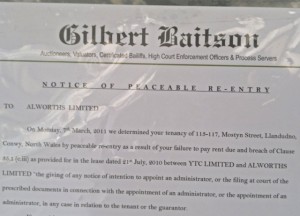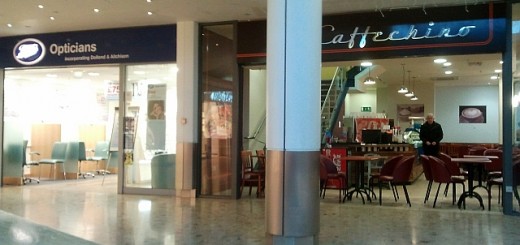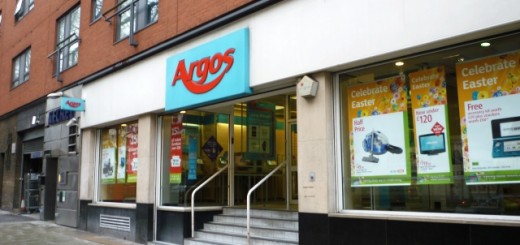Alworths’ future uncertain as bailiffs seize Llandudno store
Following a weekend of speculation about the future of ‘son of Woolworths’ chain Alworths, events have taken a further turn today with the news that bailiffs have seized the chain’s Llandudno store.
The ‘Notice of Peaceable Re-entry’ (above – click to enlarge), photographed for Soult’s Retail View by Dave Roberts, cites the business’s “failure to pay rent due” as well as “breach of Clause 35.1 (c.111) as provided for in the lease.”
This clause, according to the notice, relates to “the giving of any notice of intention to appoint an administrator, or the filing at court of the prescribed documents in connection with the appointment of an administrator, in any case in relation to the tenant or the guarantor.” This would seem to add weight to Retail Week’s article from Friday, which broke the news of Alworths’ apparent difficulties and speculated that a pre-pack administration may be on the cards.
According to Dave, the bailiffs changed the Llandudno store’s locks, with all of Alworths’ stock and fittings still inside. Only a few days ago, at least three Alworths stores – in Alloa and Evesham, as well as Llandudno – launched closing down sales, captured by Dave (above) on Friday. It’s not yet clear whether any other stores within the 17-strong chain have been subject to re-entry proceedings today.
Whatever happens next, it’s a sad and disappointing situation for a business that had promised to replicate the best bits of Woolworths while avoiding its predecessors’ pitfalls. It’s also clearly unsettling for the chain’s hardworking staff, many of whom are ex-Woolies workers and have already been through one retail collapse.
As my 18 Alworths-tagged posts testify, I’ve been consistently supportive of what Alworths has tried to achieve, and many of its business decisions have – at least outwardly – seemed sensible.
Woolworths, for example, tended to struggle with its larger stores in bigger town and city centres, but was often a key retailer in smaller communities – those places where it was the only shop in town to sell buttons, DVDs or toys. On this basis, Alworths’ decision to open relatively compact shops (less than 10,000 sq ft) in predominantly small, market town locations appeared logical.
Equally, where Woolworths struggled under its big corporate structure and relative inability to respond to local variations, Alworths’ head office has always appeared to be a leaner, nippier operation.
Perhaps most importantly, the Alworths brand seemed to be gaining recognition and popularity within the communities served by its stores – always, you might argue, one of the most powerful assets of the defunct Woolworths.
However, none of this counts for anything if the business can’t make money, and the absence of recent updates from Alworths – whether in terms of store announcements, tweets or website content – can be seen, in hindsight, as a clue to all not being well.
Over the coming days and weeks, it will no doubt become clearer whether Alworths has a future, and what form that might take. Retail Week’s article last week cited documents filed at Companies House, which showed that Alworths boss Andy Latham had resigned as a director of the company.
In turn, it reported that a new company – Retail Acquisitions, with Latham as one of its directors – had been set up, and was “expected to take control of Alworths.” However, history – such as the experiences of Vergo Retail and Ethel Austin – has showed us that former owners buying back collapsed businesses under a new name have a patchy record of success.
Understanding what has gone wrong with Alworths this time will be critical, if the same mistakes – whatever they turn out to be – are not simply to be repeated. Indeed, what makes the present episode most surprising is that Alworths’ public pronouncements have consistently suggested that the chain was trading strongly.
While Claire Robertson’s tweets give every indication that Dorchester’s Wellworths is still thriving, Alworths’ woes will raise questions over how far a ‘son of Woolworths’ formula can be resurrected at a national rather than a shop-by-shop level.
My friend and fellow retail blogger Steve Dresser, reacting on Twitter, remarked that “Woolworths failed due to it not being a practical business – Alworths was hardly going to be different.” Current events suggest that he may well be right.
UPDATE, 9 March 2011: I understand that Alworths in Llandudno is open again today, after being closed Monday and Tuesday. Presumably the unpaid rent has been sorted?














On Sunday all staff at the Alworth store in Newhaven, East Sussex were given six weeks notice of the store’s closure.
Brief update: The local paper is reporting that agreement has now been reached with the Landlord and the Llandudno Alworths reopened for business yesterday.
Thanks Dave – I’d heard that too! Good news, at least in the short term.
Shame, no idea it was this bad, I thought they were booming.